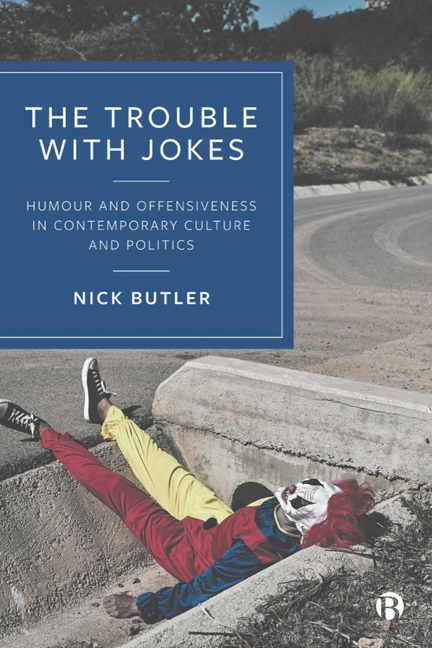Introduction
Published online by Cambridge University Press: 27 March 2024
Summary
This book is a warning label for jokes. Of course, this book is much longer and more nuanced than the kind of label you’ll find on the packaging of products with small parts. But it says basically the same thing: humour is a choking hazard. A joke is something you put in your mouth and roll around on your tongue, feeling its sharp edges and rough textures. You enjoy its taste, its consistency. Yet if you’re not careful, a joke can get stuck in your throat. One minute you’re fooling around, the next you’re gasping for air.
We’re accustomed to thinking of humour as a diversion from the serious side of life. But probe a little deeper and we see a darker side to humour. Jokes are passive-aggressive: they command us to take pleasure in their punchlines, and they won’t take no for an answer. A joke prods and pokes until it gets a response, and there’s nothing we can do about it – apart from gritting our teeth and forcing out a chuckle. At its worst, a joke can tease and taunt and bully and harass (‘The joke’s on you’). If we fail to laugh, a joke reproaches us for refusing to join in with the fun (‘Can’t you take a joke?’). And however bad it gets, a joke can always shrug its shoulders and walk away from the carnage (‘It’s just a joke’). In the not-serious world of jokes, anything is permitted and everything is fair game, and this is what makes humour so seductive and so insidious.
The Trouble with Jokes explores the hidden risks of humour in civic life. Weaving together cultural analysis, political discussion, and philosophical reflection, the book explores humour as a complex and contradictory phenomenon at the heart of modern society. The main argument of the book is that humour is a political discourse that thrives on transgression and outrage. In the public sphere, jokes obscure the line between irony and sincerity, which lowers our defences against objectionable ideologies. This explains why humour has fuelled some of the most worrying political trends today, such as the rise of the far right, the spread of online conspiracy theories, and the resurgence of violent misogyny. Academic studies on humour and politics, with some notable exceptions, tend to overstate the extent to which jokes can subvert power relations or liberate us from oppression.
- Type
- Chapter
- Information
- The Trouble with JokesHumour and Offensiveness in Contemporary Culture and Politics, pp. 1 - 11Publisher: Bristol University PressPrint publication year: 2023



